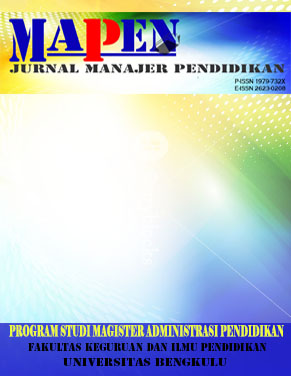Main Article Content
Abstract
In general, this study aims to describe the implementation of the Frontier, Remote, and Outermost (3T) regional elementary schools. Specifically, it aims to describe the administration of students, educators and education staff, infrastructure, public relations, finance and special services. This research uses a qualitative approach with case studies. Data collection techniques used in this research are interview, observation and documentation techniques. The results of the study revealed that based on empirical conditions that: 1) the implementation of learning was not implemented (less implemented). 2) the implementation of student activities is not implemented, 3) the implementation of educators and education staff is not implemented. 4) the implementation of facilities and infrastructure is not implemented. 5) the implementation of public relations is not implemented. 6). financial management is not implemented .7). special services are not implemented. This problem cannot be separated from the role of school human resources, both principals as managers, teachers, committees that are part of education providers and also the government as stakeholders and policies must be more comprehensive in looking at education in regions which are often separated from observations such as 3T areas
Article Details
Copyright (c) 2023 Usman Usman, SA Syaiful Anwar

This work is licensed under a Creative Commons Attribution-ShareAlike 4.0 International License.

Manajer Pendidikan by https://ejournal.unib.ac.id/index.php/manajerpendidikan/ is licensed under a Creative Commons Attribution-ShareAlike 4.0 International License.
